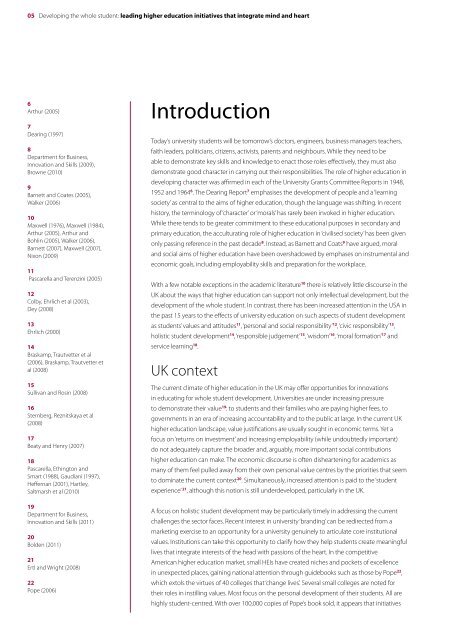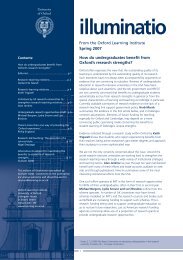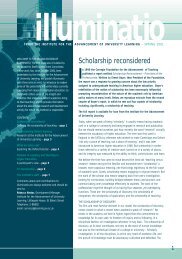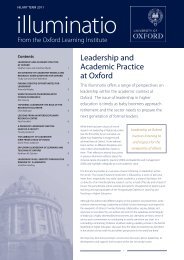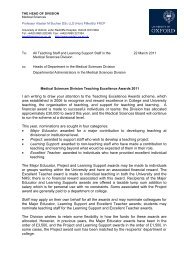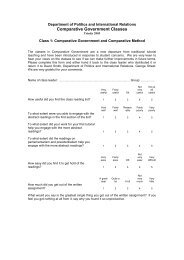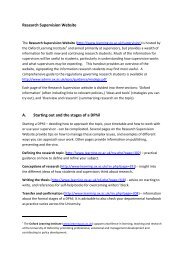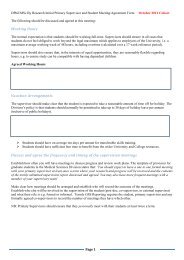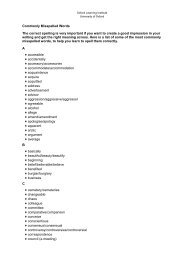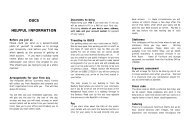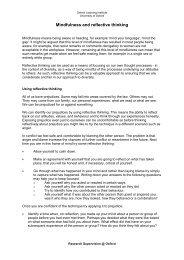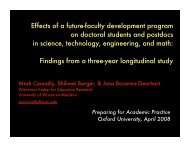Developing the whole student - Oxford Learning Institute - University ...
Developing the whole student - Oxford Learning Institute - University ...
Developing the whole student - Oxford Learning Institute - University ...
Create successful ePaper yourself
Turn your PDF publications into a flip-book with our unique Google optimized e-Paper software.
05 <strong>Developing</strong> <strong>the</strong> <strong>whole</strong> <strong>student</strong>: leading higher education initiatives that integrate mind and heart<br />
6<br />
Arthur (2005)<br />
7<br />
Dearing (1997)<br />
8<br />
Department for Business,<br />
Innovation and Skills (2009),<br />
Browne (2010)<br />
9<br />
Barnett and Coates (2005),<br />
Walker (2006)<br />
10<br />
Maxwell (1976), Maxwell (1984),<br />
Arthur (2005), Arthur and<br />
Bohlin (2005), Walker (2006),<br />
Barnett (2007), Maxwell (2007),<br />
Nixon (2009)<br />
11<br />
Pascarella and Terenzini (2005)<br />
12<br />
Colby, Ehrlich et al (2003),<br />
Dey (2008)<br />
13<br />
Ehrlich (2000)<br />
14<br />
Braskamp, Trautvetter et al<br />
(2006), Braskamp, Trautvetter et<br />
al (2008)<br />
15<br />
Sullivan and Rosin (2008)<br />
16<br />
Sternberg, Reznitskaya et al<br />
(2008)<br />
17<br />
Beaty and Henry (2007)<br />
18<br />
Pascarella, Ethington and<br />
Smart (1988), Gaudiani (1997),<br />
Heffernan (2001), Hartley,<br />
Saltmarsh et al (2010)<br />
19<br />
Department for Business,<br />
Innovation and Skills (2011)<br />
20<br />
Bolden (2011)<br />
21<br />
Ertl and Wright (2008)<br />
22<br />
Pope (2006)<br />
Introduction<br />
Today’s university <strong>student</strong>s will be tomorrow’s doctors, engineers, business managers teachers,<br />
faith leaders, politicians, citizens, activists, parents and neighbours. While <strong>the</strong>y need to be<br />
able to demonstrate key skills and knowledge to enact those roles effectively, <strong>the</strong>y must also<br />
demonstrate good character in carrying out <strong>the</strong>ir responsibilities. The role of higher education in<br />
developing character was affirmed in each of <strong>the</strong> <strong>University</strong> Grants Committee Reports in 1948,<br />
1952 and 1964 6 . The Dearing Report 7 emphasises <strong>the</strong> development of people and a ‘learning<br />
society’ as central to <strong>the</strong> aims of higher education, though <strong>the</strong> language was shifting. In recent<br />
history, <strong>the</strong> terminology of ‘character’ or ‘morals’ has rarely been invoked in higher education.<br />
While <strong>the</strong>re tends to be greater commitment to <strong>the</strong>se educational purposes in secondary and<br />
primary education, <strong>the</strong> acculturating role of higher education in ‘civilised society’ has been given<br />
only passing reference in <strong>the</strong> past decade 8 . Instead, as Barnett and Coats 9 have argued, moral<br />
and social aims of higher education have been overshadowed by emphases on instrumental and<br />
economic goals, including employability skills and preparation for <strong>the</strong> workplace.<br />
With a few notable exceptions in <strong>the</strong> academic literature 10 <strong>the</strong>re is relatively little discourse in <strong>the</strong><br />
UK about <strong>the</strong> ways that higher education can support not only intellectual development, but <strong>the</strong><br />
development of <strong>the</strong> <strong>whole</strong> <strong>student</strong>. In contrast, <strong>the</strong>re has been increased attention in <strong>the</strong> USA in<br />
<strong>the</strong> past 15 years to <strong>the</strong> effects of university education on such aspects of <strong>student</strong> development<br />
as <strong>student</strong>s’ values and attitudes 11 , ‘personal and social responsibility’ 12 , ‘civic responsibility’ 13 ,<br />
holistic <strong>student</strong> development 14 , ‘responsible judgement’ 15 , ‘wisdom’ 16 , ‘moral formation’ 17 and<br />
service learning 18 .<br />
UK context<br />
The current climate of higher education in <strong>the</strong> UK may offer opportunities for innovations<br />
in educating for <strong>whole</strong> <strong>student</strong> development. Universities are under increasing pressure<br />
to demonstrate <strong>the</strong>ir value 19 : to <strong>student</strong>s and <strong>the</strong>ir families who are paying higher fees, to<br />
governments in an era of increasing accountability and to <strong>the</strong> public at large. In <strong>the</strong> current UK<br />
higher education landscape, value justifications are usually sought in economic terms. Yet a<br />
focus on ‘returns on investment’ and increasing employability (while undoubtedly important)<br />
do not adequately capture <strong>the</strong> broader and, arguably, more important social contributions<br />
higher education can make. The economic discourse is often disheartening for academics as<br />
many of <strong>the</strong>m feel pulled away from <strong>the</strong>ir own personal value centres by <strong>the</strong> priorities that seem<br />
to dominate <strong>the</strong> current context 20 . Simultaneously, increased attention is paid to <strong>the</strong> ‘<strong>student</strong><br />
experience’ 21 , although this notion is still underdeveloped, particularly in <strong>the</strong> UK.<br />
A focus on holistic <strong>student</strong> development may be particularly timely in addressing <strong>the</strong> current<br />
challenges <strong>the</strong> sector faces. Recent interest in university ‘branding’ can be redirected from a<br />
marketing exercise to an opportunity for a university genuinely to articulate core institutional<br />
values. Institutions can take this opportunity to clarify how <strong>the</strong>y help <strong>student</strong>s create meaningful<br />
lives that integrate interests of <strong>the</strong> head with passions of <strong>the</strong> heart. In <strong>the</strong> competitive<br />
American higher education market, small HEIs have created niches and pockets of excellence<br />
in unexpected places, gaining national attention through guidebooks such as those by Pope 22 ,<br />
which extols <strong>the</strong> virtues of 40 colleges that ‘change lives’. Several small colleges are noted for<br />
<strong>the</strong>ir roles in instilling values. Most focus on <strong>the</strong> personal development of <strong>the</strong>ir <strong>student</strong>s. All are<br />
highly <strong>student</strong>-centred. With over 100,000 copies of Pope’s book sold, it appears that initiatives


